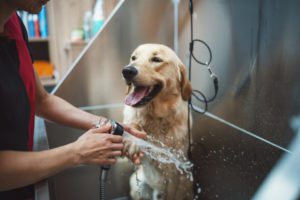
Our Veterinary Blog
Dog Hot Spots: Treatment and Prevention
A hotspot is a painful condition your dog may experience if they scratch an itch repeatedly until it is raw, red, and infected. Hot spots can not only be treated but can also be prevented.
You can treat canine hotspots with topical or oral steroids to reduce itching and topical or oral antibiotics to remedy secondary infections. Allergy medicine may address the primary cause of itching. You can help to prevent hotspots with good parasite protection and proper nutrition.
You must always check with your veterinarian prior to giving your dog any medicines or ointments, as human medicine can be toxic to them. If you want to learn more about the treatment and prevention of dog hot spots, check out this article.

What is a Hotspot?
Canine hotspots are painful, red, and inflamed lesions that contain pus or discharge. Hotspots come from a condition called acute dermatitis, and are worsened when the dog scratches them. Inflammation causes the hotspot to become warm, which is how the condition derived the name “hotspot.”
Hotspots can be raised on the skin and may cause hair loss. They generally appear quickly and can become quite large right away. Hotspots can cause significant issues, like serious infections or skin ulcerations. Hot spots can vary in size and are differentiated from other skin conditions by their moistness.
Hotspots can be found anywhere on a pup’s body, but they are usually located on the:
- Face
- Neck
- Limbs
- Hips
With hotspots, bugs or allergens may be the primary source of irritation. If your dog has a hotspot, they may chew or lick the area until it becomes an issue.
What Causes a Hotspot? 
Hot spots are generally caused by trauma due to excessive scratching, licking, or chewing. By performing any preceding actions, a dog irritates superficial nerve endings, perpetuating the cycle of licking, biting, and scratching. The cycle by which hotspots are formed is the defining characteristic of the hotpot. It can start to be the size of the head of a pin and become a giant raw area in no time.
What Are the Symptoms of the Hotspot?
Hotspots can vary in size, but they all appear as red patches of severe inflammation. Hotspots can also trigger specific symptoms:
- Incessant licking, biting, or chewing of the infected area
- Bald patches where hair should be
- Swelling of the skin
- Itchy skin
- Discharge of pus
- Unpleasant smell
- Redness
- Encrusted skin
Many other skin conditions may have similar symptoms as the hotspot, and getting a proper diagnosis from your veterinarian is the recommended avenue. Moisture from swimming or the rain will sometimes exacerbate the signs of the hotspot.
How to Treat a Hotspot on a Dog?
The main objective when treating a hotspot is to keep the hotspot cycle from continuing and inhibit the development of a deep skin infection. It is essential to stop the dog from injuring themselves by perpetuating the cycle. The following are all viable solutions for treating canine hotspots:
- Have your dog wear an Elizabethan collar (cone) to prevent further scratching
- Allergy medication that will stop the primary cause of the itching
- Topical steroids to control inflammation and reduce the itching
- Topical or oral antibiotics to remedy secondary infections
- Cleaning the infected area with a gentle antiseptic solution or solution that specifically treats hotspots
- Trimming the surrounding hair around the infected area with clippers or scissors
- Soothe the site by using a cool washcloth or compress to help with irritation, and pat dry
You can also bathe your dog with special shampoo and use medicated wipes to soothe the area. When your dog receives proper treatment from a veterinarian, their condition will typically improve rather quickly. They may even get better within three to seven days.
How Do You Prevent Hotspots? 
To stop the hotspot cycle from continuing, you must address the underlying cause of your pup’s itching. You will also need to practice preventive care for your dog and protect them from being in the situation altogether. The following include some of the best ways to prevent a hotspot on your pup:
Proper Nutrition
Poor nutrition can trigger hotspots. Irritation can present itself through:
- Digestive irritation
- Skin irritation
- Ear infections
Something as basic as a food allergy can cause your pup’s skin to itch persistently and lead to them having a hotspot. Dry commercial foods can also dehydrate your dog’s skin. If you feed your pup a high-quality diet, you can never go wrong.
Control Parasites
Fleas and other parasites are attracted to your dog’s fur. If your dog is riddled with fleas, it will no doubt irritate their skin and may cause nasty hotspots. Practicing good parasitic protection is key. You should also clean your pup and wash them with specially formulated dog shampoo about once a week.
Good Grooming
Some dogs have long, thick fur, which means that their coat needs to be trimmed regularly. The best way to safeguard your pup is to trim as little as possible, safeguarding their skin from allergens. However, you should always trim enough, so flea medications get through the skin. Take caution when grooming them.
Limit Exposure to Allergens
Seasonal allergies, like atopy, can be triggered by many different allergens:
- Ragweed
- Freshly cut grass
- Pollen
- Dust mites
All the above can contribute to seasonal allergies in dogs. Determine if anything triggers allergies in your pup and limit their exposure to it.
Alleviate Boredom
If your dog is licking or scratching themselves due to boredom, do what you need to ensure that your pup always has something entertaining to do. Invest in food puzzles and games, or take them to the dog park for a fun game of catch. Keep them physically and mentally stimulated, which can keep them from chewing, biting, and licking their skin.
Try Supplementation
Supplementing with fatty acids can help your pup and may prevent or control skin disease. Omega 3 fatty acids in fish oil deliver anti-inflammatory benefits, making your dog less likely to have allergies and infections.
Conclusion
Hotspots are painful and can cause significant discomfort for your dog. There are many treatment options that can help or even prevent your canine companion from suffering from hotspots.
For dog parents in the Lakeland, FL area, Lakeland Animal Clinic is available to serve you and your pup. Call us today at (863) 688-3338 or make an appointment online!
Recent Posts
About Us
Family is family, whether it has two legs or four. At Lakeland Animal Clinic, we've spent the last 40 years healing and caring for your pets. As a family-operated practice, we know that family is about more than simply being related. Animals give us the ability to develop strong bonds and feel great compassion for a fellow living creature.


